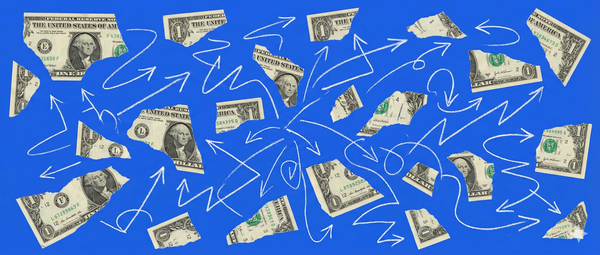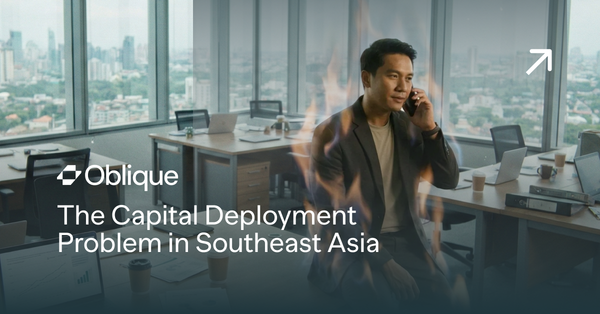Who's Still Writing Checks?
Despite a 54% funding drop in 2024, a handful of investors are still deploying capital in Southeast Asia. See who’s shaping the next cycle of innovation.

The Winter No One Saw Coming
For years, Southeast Asia's venture scene moved only in one direction—up. Money was abundant, valuations elastic, and the gospel of growth-at-all-costs drove founders from Jakarta to Ho Chi Minh City.
Then came the funding winter.
By 2024, venture funding had fallen 64% year-over-year to just $3.26 billion, its lowest since the pandemic. In Q3, the total dipped below a symbolic $1-billion mark for the first time in six years. Late-stage capital? Nearly frozen.
Yet beneath the frost, something more interesting is happening—not collapse, but recalibration. The capital didn't vanish; it's just grown cautious, waiting for the brave.
The Quiet Ones Still Buying
Q3 2024 funding: $979 million across 134 deals — a 64% YoY decline
The numbers look grim, but deal activity tells a different story.
East Ventures led with 45 deals in Q3, cementing its role as Southeast Asia's most active early-stage investor. Managing over $350 million, the firm has turned from blitzscaling to portfolio stewardship, betting on "founders building with discipline, not vanity."
Antler ranked second with 35 deals, leveraging its incubator flywheel to keep deal flow alive. Its AI Disrupt program deployed $2.8 million across seven early-stage AI startups, showing conviction where others hesitated.
AC Ventures followed closely with 32 deals, doubling down on Indonesia's digital economy and reaching a collective portfolio GMV of $2.3 billion.
"Founders are building with discipline, not just growth at any cost." — East Ventures
These aren't reckless investors—they're builders who've survived enough winters to know when to buy cheap.
The Geography of Risk
Singapore remains the gravitational center of SEA capital, capturing 60% of all funding while hosting only 39% of deals. The city-state is the region's bunker—where capital shelters when things get uncertain.
Indonesia continues to hold its ground with nearly 19% of funding, its domestic demand providing insulation against global volatility. Vietnam, once the darling of emerging-market narratives, saw its share fall to just 8%.
Meanwhile, deal dynamics are shifting. Early-stage rounds now make up 75% of all activity but only 30% of capital, signaling a move toward smaller, conviction-led bets and away from speculative Series B and C plays.
Q3 2024 Funding by Country
| Country | Funding (US$M) | % of Total |
|---|---|---|
| Singapore | 587 | 60.0% |
| Indonesia | 185 | 18.9% |
| Vietnam | 78 | 8.0% |
| Thailand | 62 | 6.3% |
| Malaysia | 45 | 4.6% |
| Philippines | 22 | 2.2% |
Sectors Still in Motion
Fintech: The Resilient Core
Even in retreat, fintech remains the region's workhorse. The sector drew $821 million across 78 deals—about 25% of all funding.
But the playbook has changed: the age of consumer "super apps" is over. Investors now chase B2B infrastructure—payment rails, lending APIs, and embedded finance platforms. The common denominator? Clear revenue and cash discipline.
"The days of burning cash for market share are over." — Insignia Ventures
AI: Promise and Pragmatism
AI has become the new magnet for conviction capital. SEA startups raised $387 million in 2024, small compared to global trends but growing fast.
Vietnam's AI Hay raised $10 million in Series A; Singapore's Locofy.ai and Mindverse are building pragmatic AI layers that solve real operator problems rather than chasing AGI headlines.
Multinationals are filling the infrastructure gap—Microsoft, NVIDIA, and AWS have collectively pledged $60 billion to develop compute and data centers across the region.
Climate Tech: The Quiet Revolution
Climate tech remains under-invested—just 6% of total funding—but carries outsized potential. The Green Climate Fund's $221-million commitment in July 2024 marked a turning point, sparking a wave of climate-focused VC activity.
Wavemaker Partners, through its Wavemaker Impact fund, is backing startups in waste management, agritech, and solar. Its thesis: SEA's climate market could be worth $350 billion by 2030.
Sector Funding YTD 2024
| Sector | Funding (US$M) | % of Total |
|---|---|---|
| Fintech | 821 | 25.1% |
| SaaS | 425 | 13.0% |
| AI/ML | 387 | 11.8% |
| Logistics | 312 | 9.5% |
| Healthcare | 289 | 8.8% |
| E-commerce | 245 | 7.5% |
| Climate Tech | 198 | 6.1% |
| Others | 589 | 18.2% |
The Rise of Strategic Capital
The funding freeze has accelerated a structural shift: who writes the checks now matters more than how big they are.
Sovereign and Corporate Money
Temasek and GIC have reshaped their startup strategies. Temasek led ANEXT Bank's $148-million Series D, while GIC quietly deployed $1.9 billion into European AI startups—signaling diversification beyond the region.
Japanese and Chinese corporates are re-entering the field through strategic arms. Alibaba's $230-million Lazada round shows that even amid geopolitical friction, Southeast Asia remains an irresistible growth proxy.
Family Offices and Patient LPs
Family offices now represent one-third of SEA's limited partners, up from 20% in 2020. Singapore's Variable Capital Company (VCC) framework, designed for global wealth migration, has attracted over 1,100 family offices managing $4 trillion.
This new class of investors trades quarterly returns for generational bets. They prefer resilience over rocketships.
Governments as Market Makers
When venture capital retreats, governments step in.
Programs like Singapore's SEEDS Capital, Malaysia's Cradle Fund, and Indonesia's Merah Putih Fund are co-investing with private capital to de-risk innovation. The result: a hybrid ecosystem that tempers volatility with policy ballast.
A New Investment Playbook
The region's thesis has evolved:
from growth → efficiency,
from regional → global,
and from horizontal → vertical specialization.
Startups are now expected to show profitability within 3–4 years, not 7–8. B2B SaaS raised $425 million (13% of funding) last year, buoyed by clear unit economics. Profitability now commands a 3.5× valuation premium at Series A.
3.5× Premium: Average valuation gap between profitable and unprofitable Series A startups in 2024
Runway discipline has become the new founder flex. The post-hype era is favoring execution over evangelism.
Cross-Border as Proof of Maturity
Southeast Asia's fragmentation—long viewed as friction—is now a feature. Investors see startups that operate across markets as pre-tested for global expansion.
Singapore-based holding structures dominate fundraising, capturing 67% of ASEAN deal value despite representing less than 40% of deals.
Beyond SaaS and fintech, deep tech quietly tripled its funding in 2024 to $280 million. Biotechnology, materials, and quantum ventures are drawing patient capital through programs like SGInnovate's Deep Tech Catalyst.
Top 10 Active Investors in Southeast Asia, Q3 2024
| Fund | Country | Deals Q3 2024 | Focus Stage | Key Sectors |
|---|---|---|---|---|
| East Ventures | ID/SG | 45 | Seed to Series B | Digital transformation, AI, Consumer |
| Antler | SG | 35 | Pre-seed to Seed | AI, Fintech, Consumer tech |
| AC Ventures | ID | 32 | Seed to Growth | Fintech, E-commerce, Logistics |
| 500 Global | US/SG | 30 | Pre-seed to Series A | Technology-agnostic |
| Jungle Ventures | SG | 28 | Series A to Growth | B2B, SaaS, Fintech |
| Insignia Ventures Partners | SG | 25 | Series A and above | Fintech, E-commerce, SaaS |
| Wavemaker Partners | SG/US | 22 | Pre-seed to Series A | Deep tech, Enterprise, Sustainability |
| Monk's Hill Ventures | SG | 18 | Early to Growth | AI, Fintech, Healthtech |
| Golden Gate Ventures | SG | 15 | Seed to Series A | Consumer, Marketplaces |
| Temasek Holdings | SG | 12 | Growth to Late | AI, Infrastructure, Fintech |
Signals of Recovery
There's roughly $600 million in undeployed dry powder sitting in SEA funds. Public markets are recovering, LP confidence is returning, and founders are rebuilding with restraint.
The next wave of SEA unicorns will look different: smaller, profitable, regionally diversified. They'll be less like Grab and more like Linear or PayMongo—disciplined, product-obsessed, financially sound.
"The bar is higher, the process longer—but the opportunity has never been greater."
Southeast Asia's startup ecosystem isn't dying—it's maturing.
The question isn't whether it will recover.
It's who's already positioning themselves to shape the rebound.





